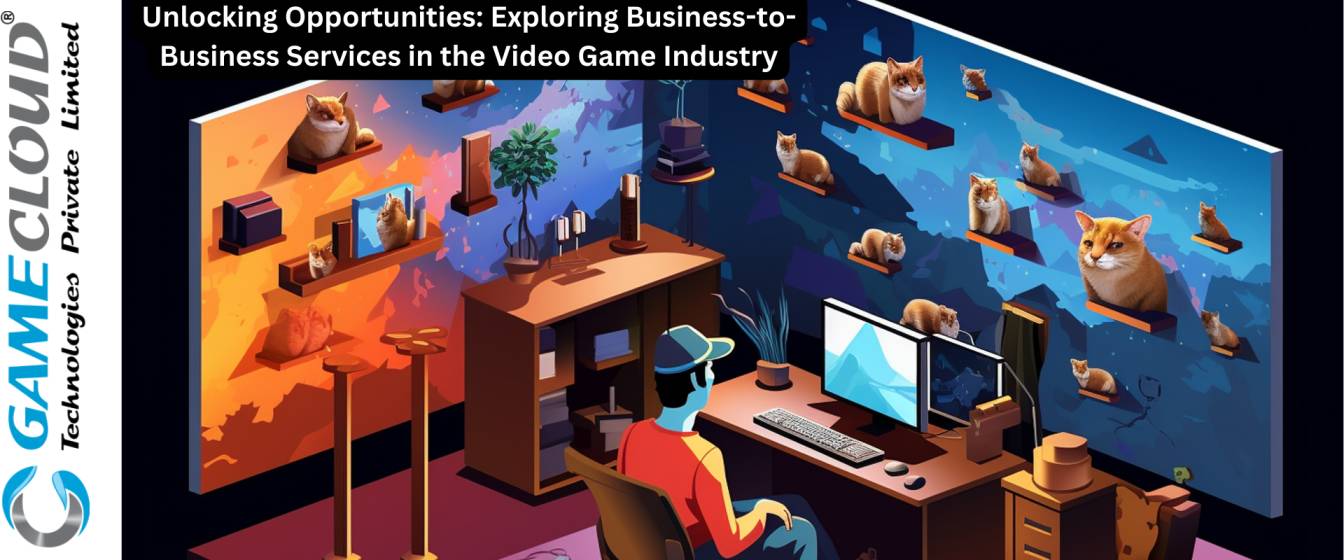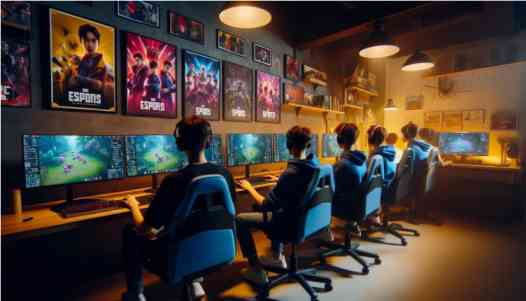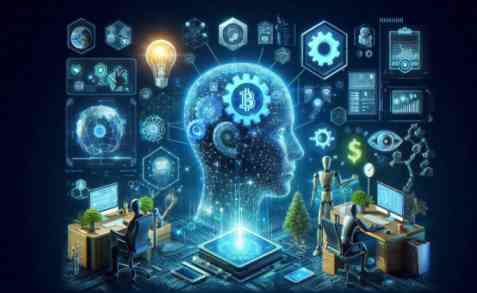
The video game industry has evolved significantly over the past few decades, with the rise of digital distribution, mobile gaming, and live service models. As the industry continues to grow and diversify, so too do the business-to-business (B2B) services that support it. In this blog post, we will explore the various B2B services available in the video game industry, examine the current landscape, and make predictions about future trends.
The Role of B2B Services in the Video Game Industry
- B2B services play a crucial role in the video game industry by providing essential tools, technologies, and support to game developers, publishers, and platforms. These services encompass various areas such as game engines, middleware, analytics, monetization, player engagement, localization, and more. Game engines like Unity and Unreal Engine provide the foundation for game development, while middleware offers specialized software for tasks like physics simulation and networking.
- Analytics and player engagement tools help developers gain insights into player behavior, retention, and monetization strategies. Monetization services assist in managing virtual currencies, payment gateways, and optimizing revenue streams. Localization services cater to the global market by translating text and adapting games for different regions.
- Moreover, B2B services extend to esports and live events, providing tools for managing tournaments, streaming live events, and engaging with fans. Companies like Battlefy and Twitch offer solutions for tournament management and live streaming, enhancing the esports experience.
Game Engines and Middleware
Game engines are the foundation upon which games are built, providing a framework for rendering graphics, handling input, and managing game logic. Unity and Unreal Engine are two of the most popular game engines, with Unity boasting over 5 million registered developers and Unreal Engine powering many of the industry’s most successful games, such as Fortnite and Gears of War.
Middleware refers to specialized software that provides specific functionality to game developers, such as physics simulation, audio processing, or networking. Examples of popular middleware include FMOD for audio, Havok for physics, and Photon for networking.
- Game engines provide a framework for rendering graphics, handling input, and managing game logic, while middleware offers specialized software for specific tasks like physics simulation, audio processing, or networking.
- Game engines use pointers to reference and manipulate game objects and assets, while middleware may use pointers to pass data between different components and systems.
- Smart pointers are generally avoided in performance-critical game engines and middleware due to the cost of atomic operations. Memory ownership responsibility is left to the user.
- Game engines are designed to be thread-aware and handle synchronization internally. Some middleware may provide abstractions for locks and synchronization primitives.

Analytics and Player Engagement
As games become more complex and data-driven, the need for robust analytics and player engagement tools has grown. B2B services in this space provide game developers with insights into player behavior, retention, and monetization. Examples include Amplitude for analytics, Playfab for backend services, and Overwolf for in-game overlays.
- Analytics and player engagement tools help developers gain insights into player behavior, retention, and monetization strategies.
- By analyzing user data, game developers can track user engagement and identify revenue-generating opportunities, such as popular games, best-selling in-game items, and effective marketing strategies.
- Data analytics provides valuable insights into user behavior, allowing developers to improve user experience and engagement by identifying popular features, reasons for uninstalls, and ways to improve retention rates.
- Analytics can help optimize ad campaigns by identifying effective ad formats and regions with the highest ROI based on metrics like cost per install (CPI) by ad format.
- Analyzing player conversations, sentiments, and trends on social media allows gaming companies to shape their games based on real-time player insights and make data-driven decisions in the game development process.
Monetization and Payments
Monetization is a critical aspect of modern game development, with many games relying on in-app purchases, subscriptions, and other revenue streams. B2B services in this area provide game developers with tools for managing virtual currencies, implementing payment gateways, and optimizing monetization strategies. Examples include Xsolla for payments, Overwolf for in-game overlays, and Chartboost for mobile advertising.
- Game monetization is crucial for developers to generate revenue and create a sustainable business model without compromising the player experience.
- The most effective monetization model depends on the expectations of players around that type of game. Upfront paid games should have subtle monetization, while free-to-play games can be more aggressive.
- In-game purchases like microtransactions, loot boxes, and battle passes should allow players to achieve similar results whether they pay or not. The ideal model makes players happy to support a game they enjoy.
- Different monetization models provide players with choices, such as a free experience with ads and limited features, or investing to unlock additional content and personalization.
- Reliable revenue from monetization enables developers to invest in game quality, hire top talent, conduct thorough testing, and create polished experiences.
- The gaming industry has evolved from primarily selling physical/digital copies to experimenting with diverse monetization methods like in-game purchases, subscriptions, and free-to-play strategies.
- In-game purchases are a common monetization tactic, allowing players to buy virtual items, currencies, or advantages. They should enhance the experience without feeling like a paywall.
- Subscription models provide ongoing revenue by charging a recurring fee for access to a game or service. They work well for live service games with regular content updates.
- Free-to-play games are free to download and play, monetizing through in-game purchases. They have a low barrier to entry but must provide value to incentivize purchases.
- Choosing the right monetization mix is crucial for balancing revenue generation with player satisfaction. Developers must adapt to market trends and player expectations.

Localization and Globalization
As games become more popular worldwide, the need for localization and globalization services has increased. B2B services in this space provide game developers with tools for translating text, adapting cultural references, and optimizing games for different markets. Examples include Localize Direct for localization, Xsolla for payments, and Chartboost for mobile advertising.
Localization and globalization are essential processes in the video game industry that cater to diverse audiences worldwide. Here are the key points extracted from the provided sources regarding localization and globalization in the context of video games:
- Localization involves adapting a video game for a market outside of where it was originally published. This process includes altering the game’s name, art assets, packaging, manuals, and addressing cultural and legal differences to make the game more appealing to local gamers and expand the user base.
- Globalization in the gaming industry has led to a surge in international competition and a wider range of player demographics. The process of globalization has made games more accessible and profitable than ever before, with the internet, cloud technology, and localization playing crucial roles in this transformation.
- Benefits of Localization include expanding the audience, introducing new revenue streams, and adapting to cultural expectations. By localizing games, developers can reach a broader audience, tap into new revenue opportunities, and ensure that the game resonates with users by adapting to cultural norms and expectations.
- Localization Challenges include the need to translate text, adapt imagery, and adjust cultural references to resonate with local players. The process involves translating various components like user interface, NPC dialogues, quest descriptions, and in-game announcements to create an immersive experience for players in different regions.
- Global Reach in gaming has been facilitated by advancements in technology, enabling players from diverse cultures to share the same gaming experiences. The global gaming community is vast, with billions of gamers worldwide, highlighting the importance of localization and globalization in reaching and engaging this diverse audience.
Esports and Live Events
The rise of esports has created a new market for B2B services, with companies providing tools for managing tournaments, streaming live events, and engaging with fans. Examples include Battlefy for tournament management, Twitch for live streaming, and Gamer Sensei for coaching and training.
- Esports live events are a significant part of the gaming industry, offering opportunities for players to compete in tournaments and for audiences to watch matches online through platforms like Twitch and YouTube.
- Falmouth University offers a degree program in Esports & Livestreaming, preparing students for careers in esports production companies, community management at developer-publishers, and adjacent live streaming opportunities working for non-esports broadcasters and content creation hubs.
- Sofascore provides a free live score service for esports, allowing fans to follow real-time scores, fixtures, and results across various esports titles. This platform offers a convenient way for fans to stay updated on their favorite teams and matches.
- The Olympic Esports Series and Week 2023 is a global virtual and simulated sports competition that includes the Olympic Esports Week, streamed live online. This event showcases the best players worldwide and provides access to performance and well-being tips for gamers.
- LoL Esports is a platform dedicated to League of Legends Esports, offering fans the best place to watch matches and earn rewards. This platform provides a hub for fans to engage with the competitive scene of League of Legends and stay updated on tournaments and events.
The sources highlight the growing popularity of esports and live events, with universities offering specialized degrees, platforms providing live score services, and major events like the Olympic Esports Series showcasing the best players globally.
Current Landscape and Futuristic Trends
The current landscape of B2B services in the video game industry is characterized by a high degree of specialization and innovation. Many companies are focusing on niche areas, such as mobile game monetization or VR game development, while others are exploring emerging technologies like blockchain and cloud gaming.
One of the most significant trends in the industry is the rise of cloud gaming, which allows players to stream games directly from the cloud without the need for local hardware. This has created new opportunities for B2B services, with companies providing tools for game streaming, cloud infrastructure, and player engagement.
Another trend is the increasing importance of data and analytics in game development. As games become more complex and data-driven, the need for sophisticated analytics tools has grown. Many B2B services are now offering advanced analytics capabilities, such as predictive modeling and real-time dashboards.
Looking to the future, we can expect to see continued innovation and disruption in the B2B services space. Some potential areas of growth include:
- Artificial Intelligence and Machine Learning: AI and ML will play an increasingly important role in game development, with B2B services providing tools for procedural content generation, player behavior prediction, and game balancing.
- Blockchain and Cryptocurrency: Blockchain technology has the potential to revolutionize in-game economies and player-owned assets. B2B services may offer tools for managing blockchain-based virtual currencies and non-fungible tokens (NFTs).
- Augmented Reality and Virtual Reality: As AR and VR technologies continue to evolve, B2B services will need to adapt to provide tools for developing and monetizing immersive games and experiences.
- Sustainability and Social Responsibility: As the video game industry grows, there will be an increasing focus on sustainability and social responsibility. B2B services may offer tools for reducing environmental impact, promoting diversity and inclusion, and supporting mental health and well-being.

LolzSoft Redefining the Gaming Landscape
LolzSoft, a subsidiary of GameCloud Technologies Pvt Ltd, is a pioneering force in video game development, focusing on innovative and educational gaming experiences. Specializing in Rapid Game Prototyping, we combine humour and creativity to redefine the gaming landscape. Our commitment to creating games that entertain, educate, and inspire aligns with the evolving trends in the gaming industry. In this blog, our expertise in game validation, assurance, and confidence solutions, alongside their dedication to quality and impact, showcases how they are at the forefront of shaping the future of gaming through meaningful and engaging experiences.
Conclusion
The B2B services landscape in the video game industry is a dynamic and rapidly evolving space, with companies offering a wide range of tools and technologies to support game developers, publishers, and platforms. As the industry continues to grow and change, we can expect to see continued innovation and disruption in this space, with new technologies and business models emerging to meet the needs of an increasingly complex and data-driven industry.
